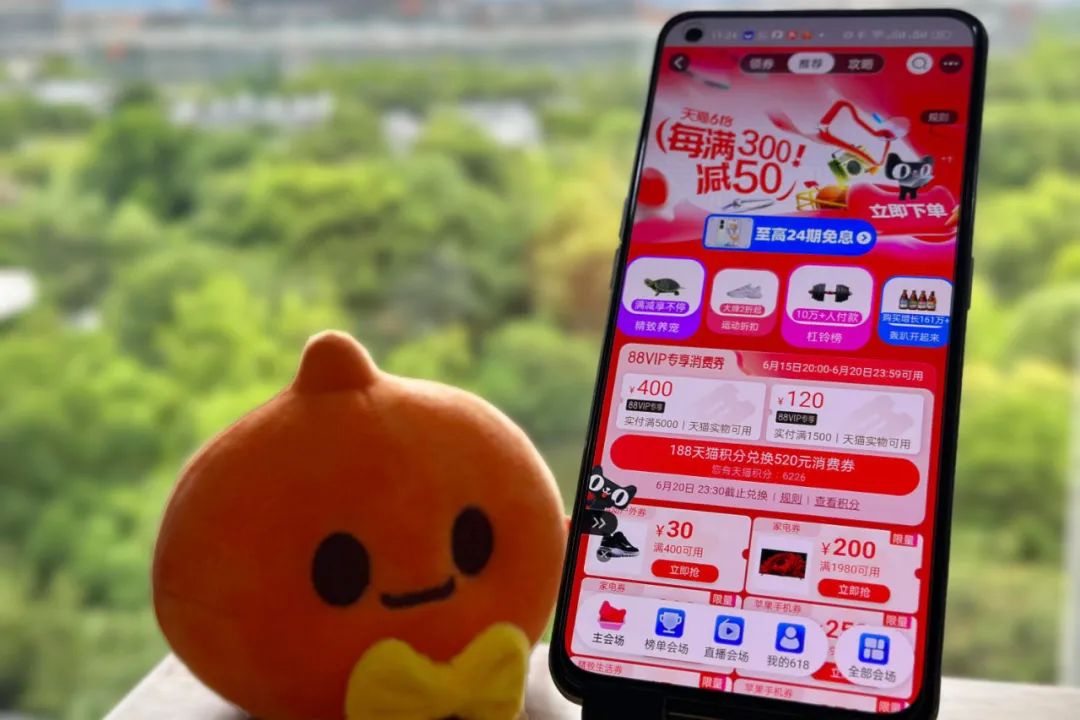Reflections from Taobao and Tmall after 618
![]() 07/17 2024
07/17 2024
![]() 607
607

By Lu Qianying
Edited by Ziye
After this year's 618, Taobao and Tmall re-examined their "absolute low price" strategy.
Not long ago, the Taobao and Tmall Group held an important closed-door meeting with merchants, clarifying multiple strategic adjustments to be implemented in the second half of the year. According to 36Kr, the most significant change is that the system of allocating search weight based on "Five-Star Price Power" since last year has been weakened and reverted to allocation based on GMV.
Specifically, in terms of business indicators, the focus of Taobao's assessment this year has shifted to GMV (Gross Merchandise Volume) and AAC (Average Amount per Consumer), rather than pursuing high DAC (Daily Active Consumers) driven by low prices.
In addition, Taobao and Tmall have also made changes to their supply strategy for white-label products: Taobao Factory introduced "Black Label Stores" this year to attract merchants with sales exceeding 100 million on Pinduoduo; 1688 will access Taobao's primary traffic entrance in the second half of this year, allowing high-quality manufacturers to sell directly on Taobao through a semi-managed model.
Amidst the fierce price wars in e-commerce, this move by Taobao and Tmall seems to go against the trend but is actually an adjustment based on the results of last year's "low-price strategy" trials.
From a financial report perspective, the "absolute low-price strategy" pursued over the past year did not bring significant growth to Taobao and Tmall. Alibaba's financial report for the third quarter of fiscal year 2024 (the fourth quarter of 2023) showed that the Taobao and Tmall Group's revenue was 129.07 billion yuan, an increase of only 2% year-on-year. For fiscal year 2024 (April 1, 2023, to March 31, 2024), the Taobao and Tmall Group's revenue was 434.893 billion yuan, an increase of 5% year-on-year.
In response to low-price competition, Taobao and Tmall have been active.
In March 2023, Taobao and Tmall introduced the Five-Star Price Power evaluation system; at the 2023 Taobao and Tmall 618 Merchants Conference on May 10, then-CEO Dai Shan outlined three key priorities: good products at good prices, Taobao's Good Price Festival, and engaging short videos and live streams; during the subsequent Singles' Day, low prices were elevated to the most important evaluation indicator for all departments.
While pursuing low prices, Jack Ma set the tone for Taobao and Tmall's development with a "customer-first" approach. In mid-last year, Jack Ma pointed out three directions for Taobao and Tmall: returning to Taobao, returning to users, and returning to the internet. In September last year, Wu Yongming became the new CEO of the Taobao and Tmall Group, continuing to lead the group's breakthrough along this direction.
Throughout the adjustment process, Taobao and Tmall have also faced strong attacks from competitors. On November 29, 2023, Pinduoduo's market value surpassed that of the Taobao and Tmall Group for the first time, and Alibaba and Pinduoduo's market values alternated in leading positions for nearly half a month thereafter.
Today, the adjustment to the low-price strategy and the emphasis on meeting the needs of users and merchants reveal the "reflections" of Wu Yongming and the new management team. How to leverage their strengths and avoid weaknesses, and leverage their platform's advantages, is an important proposition for Taobao and Tmall to consider this year.
1. Taobao and Tmall Rethink the "Low-Price Strategy"
Since Wu Yongming took office, Alibaba has re-emphasized the importance of its e-commerce segment. According to 36Kr, Taobao and Tmall's low-price strategy has gradually been weakened since the beginning of this year.
After this year's 618 shopping festival, this directional shift became clearer. At the closed-door meeting at the end of June this year, the core strategic change was to no longer emphasize low prices.
Specifically, this is reflected in changes to various indicators. Foremost among them is the focus on search traffic allocation, weakening "Five-Star Price Power" and returning to allocation based on GMV (Gross Merchandise Volume). Internal evaluation indicators have also changed, shifting from an emphasis on DAC (Daily Active Consumers) to GMV and AAC (Average Amount per Consumer).

The Five-Star Price Power is a traffic allocation mechanism introduced by Taobao in February last year, where intra-platform traffic is allocated based on the price competitiveness of products. In other words, the lower the price of a product compared to similar ones, the higher its star rating, and thus the greater the platform support it receives.
The launch of the price competitiveness strategy meant that Taobao was caught up in the spiral of low-price competition. After a year of trials, Alibaba re-emphasized GMV rather than blindly pursuing low prices.
Correspondingly, Taobao places greater importance on user experience and has made more detailed operational optimizations. It is reported that Taobao will replace DSR with PXI as an indicator affecting search weight, which is currently in the gray test stage.
The DSR index is a scoring system that Taobao has used for nearly a decade, primarily used to evaluate store performance and an important reference for consumers in judging the reliability of stores. It determines a store's weight in search results, eligibility for marketing activities, and policy benefits enjoyed.
The PXI index focuses on evaluating specific products using more detailed indicators such as negative review rates, delayed shipments, out-of-stock rates, logistics negative reviews, non-subjective reasons for refunds and complaint orders, etc. The score ranges from 0 to 100, with higher-scoring products receiving more exposure opportunities in scenarios such as Taobao search, "Guess You Like," and advertising placements.
Obviously, the latter indicator places greater emphasis on user experience, evaluating whether products are more popular through multi-dimensional indicators.
Of course, Taobao and Tmall have not completely abandoned low prices. There have also been optimizations to their supply strategy for white-label products. One example is 1688's entry into Taobao. It is understood that 1688's manufacturers can directly enter Taobao through a semi-managed model to connect with C-end consumers. 1688 will open three stores on Taobao: Yanxuan Taobao Store, Enterprise Self-Procurement Tmall Store, and Industrial Expert Selection Tmall Store.
It can be seen that Taobao and Tmall are continuously exploring how to balance user experience and low prices.
In fact, blindly pursuing low prices is not necessarily effective, as can be seen from Taobao and Tmall's fourth-quarter financial report last year.
In the fourth quarter of last year, the growth in Taobao and Tmall's GMV was mainly due to an increase in the number of transacting buyers and order volume, but this growth was partially offset by a decline in the average order amount. As a result, the revenue of the Taobao and Tmall segment increased by only 2% year-on-year.

Image source: Alibaba official website
The data reveals a harsher reality. Despite frequently introducing new strategies and slogans, Alibaba does not have many advantages in competing on low prices.
It is understood that the weakening of the low-price strategy began earlier this year, and the new management team has consistently followed the "customer-first" strategic direction.
According to the latest quarterly report, in the first quarter of 2024, the Taobao and Tmall Group achieved double-digit year-on-year growth in both GMV and order volume. Meanwhile, the number of 88VIP members reached 35 million, with a double-digit year-on-year growth rate. The Taobao and Tmall Group achieved revenue of 93.216 billion yuan, an increase of 4% year-on-year, and Customer Management Revenue (CMR) increased by 5% year-on-year, exceeding market expectations.
This performance proves that Taobao and Tmall's customer-first strategy over the past period has been effective.
In fact, since announcing GMV in the first quarter of 2021, Alibaba has stopped publicly disclosing this data. From the third quarter of 2021, the GMV growth of Taobao and Tmall continued to decline, with single-digit growth becoming the norm, and occasionally even negative growth.
Therefore, achieving double-digit GMV growth in the first quarter of this year is indeed not easy, and the new management team and strategies have brought signs of recovery to Alibaba.
However, to return to a high-growth trajectory, Taobao and Tmall need to understand the real needs of merchants and users and forge a development path unique to their ecosystem.
2. What Do Merchants and Users Expect from Taobao and Tmall?
Reviewing Taobao and Tmall's low-price route is essentially following market trends.
After Pinduoduo emerged, the entire e-commerce market could no longer ignore the appeal of low prices.
In March 2020, Alibaba launched the Taobao Tejia version app (later renamed Taote), seen as a proactive move to seize market share in response to Pinduoduo's rapid expansion. According to QuestMobile data, Taobao Tejia's user base grew by 550% year-on-year in 2020, making it the fastest-growing mobile app in terms of user scale in the annual mobile internet space.
However, due to multiple subsequent adjustments, Taote gradually blurred its boundaries with Taobao and lost its appeal to users. Until now, Taote has gradually faded from consumers' sight.
Previously, a senior executive in Alibaba's e-commerce business told the media that "Taote was quite successful in the early stages, growing rapidly, but later the group's strategy contracted, and it no longer continued to 'burn money,' abruptly halting the project."
In recent years, amid significant changes in overall consumer trends in the market, the main applications of the Taobao and Tmall Group in response to market changes and competition from Pinduoduo have shifted from the original Taote and wholesale platform 1688 back to Taobao.
An obvious signal is that e-commerce-related resources are also returning to Taobao. For example, since the beginning of this year, merchants and products on the Taote platform are accelerating their migration back to Taobao, and 1688 has also started opening stores on Taobao.
Taobao is also actively seeking changes in various aspects such as pricing systems and user services.
In March 2023, the Taobao and Tmall Group launched a price competitiveness strategy and released a five-star rating system for merchants. Subsequently, during the two most important consumption festivals of the year, Taobao and Tmall used low prices as their core slogan, attracting users with subsidies worth tens of billions of yuan.
It has also accelerated learning from competitors. In December last year, Taobao implemented a new after-sales rule of "only refunds," and soon after, JD.com followed suit with a similar policy.
The changes made by Taobao and Tmall are obviously referencing Pinduoduo's customer acquisition methods. However, whether Pinduoduo's practices can be successfully transplanted to the Taobao and Tmall Group is questionable. From merchant and user feedback, blindly engaging in low-price competition has made Alibaba ill-suited to the local environment.

Image source: Alibaba official website
In October last year, "Qianniu Open Class," jointly produced by Qianniu and Taobao Education, released a video titled "Five-Star Price Power: Faster Empowerment, More Traffic, Stronger Conversion," attracting over 800 comments. Merchants expressed doubts and dissatisfaction with this evaluation system in the comment section.
One merchant bluntly stated, "Inferior low-priced products have price competitiveness? The role of the platform is to promote good products to consumers, not so-called high-price-competitiveness low-priced and inferior products."
Many merchants are deeply concerned about the continuous price war. Some comments mentioned that if the low-price strategy continues, only a few top stores in each category will survive in the market.
Many merchants believe that their profits are becoming increasingly thin, and endless price wars not only squeeze merchant interests but also turn Taobao into a platform dominated by inferior products. This goes against the original intention of Taobao and Tmall – "making it easy for everyone to do business."
In fact, for small and medium-sized merchants, business is indeed becoming increasingly difficult. Merchants have to offer discounts during consumption festivals, but if they fail to offer the lowest prices, they will not receive platform traffic support. As a result, even if they lower prices, they may not receive traffic, making it difficult for small and medium-sized merchants to increase customer acquisition.
From a user perspective, the platform's low-price competition has indeed brought certain benefits to consumers, but some users have expressed discomfort on social platforms. After searching for keywords on Taobao, most of the top-ranked products are white-label products, and there is an overabundance of homogenized products, making it difficult for some users to adapt to such changes.
At the same time, users who place more emphasis on service will be more concerned about issues such as excessively long pre-sale periods and poor after-sales service.
In response to the above issues, during this year's 618 event, Taobao abolished pre-sales and completely integrated the two platforms of Taobao and Tmall to achieve cumulative discounts, hailed as "the simplest Tmall 618 in history." In terms of low prices, Taobao offered direct discounts and over 15 billion yuan in coupons, including exclusive coupons worth over 10 billion yuan for 88VIP members. Additionally, Taobao live streams, specific categories, and the Hundred Billion Subsidy venue also provided coupons.

Image source: Alibaba official website
To enhance user experience, Taobao launched free shipping services to Xinjiang and unlimited return shipping services for members, while Tmall allows consumers to compare prices and receive price differences as compensation from the time of payment until July 5.
In terms of merchant support, Taobao and Tmall have also provided larger-scale financial and logistics support. Eligible merchants can enjoy rapid payment services to reduce cash flow pressure. Based on cooperation with Cainiao and Ant Group, Taobao and Tmall offer logistics subsidies and shipping insurance discounts, such as providing merchants with multiple tiers of subsidy coupons during the shipping stage. Additionally, merchants can use AI tools provided by Taobao and Tmall for free to improve marketing efficiency.
Overall, both merchants and users have their respective requirements for Taobao. Merchants hope that Taobao can protect sellers' rights and interests and not blindly engage in low-price competition, while users want lower prices and better services.
How to balance the interests of both sides while maintaining its own growth is a persistent challenge facing Taobao.
3. The New Management Team Needs to Be More Flexible
Overall, Taobao and Tmall face a relatively severe environment, facing strong external competitors, internal merchant appeasement, and capital market scrutiny of growth performance.
Therefore, a young, energetic, and combat-ready management team is what Taobao and Tmall need at this stage.
On December 22nd of last year, just two days after assuming his position, Wu Yongming promptly initiated a significant personnel restructuring. He personally selected the new management team. The core management of the entire Taotian Group underwent a major overhaul. The original "SME Development Center," "Brand Merchant Development Center," and "Supermarket Business Development Center" were renamed, and a new Apparel Development Department was added, bringing the total to six major business divisions.
Simultaneously, six young managers were appointed to lead key businesses within the Taotian Group, all reporting to Wu Yongming.
Among them, Wu Jia is currently the General Manager of Alibaba’s Intelligent Information Business Group and has taken over the product technology line of the Taotian Group. He also oversees the Search and Recommendation Business and the Alimama Business Unit.
Chen Weiye (alias: Chuduan) is responsible for the Taobao Business Unit, the Taotian Merchant Platform Department, and the Taotian Customer Satisfaction Department.
Liu Bo (alias: Jialuo) heads the Brand Merchant Development Center, leading the Tmall Business Unit, which includes Tmall, 88VIP, and Tmall Global.
Liu Yiman (alias: Yiman) is in charge of the M2C Business Unit, covering quasi-self-operated businesses (Tmall Supermarket) and supply businesses (industrial belts).
Wang Tingxiang (alias: Shaoyou) is the youngest member of the management team, currently serving as the head of the Apparel Development Department.
Cheng Daofang (alias: Daofang) is responsible for Taobao Live and Content Business, including the short video app DianTao and Guangguang.
However, Cheng Daofang recently announced on social media that he no longer holds this position and is no longer responsible for Taobao Live and Guangguang’s related businesses. He stated that he will now focus on work related to embodied intelligence. It is understood that Wu Jia will take over this position.
The personnel changes reflect shifts in the group’s strategic goals, with Alibaba needing a younger team to lead the charge. Wu Yongming’s directive for the Taotian Group was to face current realities and embark on a new entrepreneurial journey.
Since the new management team took office late last year, they have implemented more refined operations across multiple dimensions.
According to a report by "LatePost," Wu Jia, head of the Taotian User Platform Business Unit, has already made adjustments to the search and algorithm on the Taobao App. He has cleaned up the information flow of short video content, refocusing the homepage traffic, diluted by content, back on efficiency and transactions. Additionally, the overall user-end strategy prioritizes low prices as the most crucial consideration to further enhance user experience.
At the same time, Chen Weiye (alias: Chuduan) is reorganizing the business processes and rules of the merchant platform and customer service. Shortly after taking office, Liu Bo (alias: Jialuo) disbanded the EDLP (Everyday Low Price) department, which focused on low-price business, and restructured the business priorities.
Live streaming is also one of Taotian's key focus areas this year. At the end of March, during the 2024 Taobao Content E-commerce Festival hosted by the Taotian Group, Cheng Daofang announced the growth targets for Taobao Content E-commerce for the new fiscal year 2025 (from April 1, 2024, to March 31, 2025): doubling the user base, doubling the number of broadcasters with monthly transactions exceeding one million, and achieving an 80% year-over-year increase in total Gross Merchandise Volume (GMV). He also stated that the Taobao Content E-commerce Business Unit would add an additional 10 billion yuan in cash investment based on last year.
Taotian Group's investments in this area are also increasing. At the time, Cheng Daofang stated that the group would add 10 billion yuan in cash and 100 billion in traffic, "investing real money to bolster content e-commerce."
These measures have shown some results, as seen in this year's 618 shopping festival. According to the 618 battle report released by Taobao Live, as of 24:00 on June 20, during the 618 period this year, the number of live rooms with GMV exceeding 100 million yuan reached 90, and those exceeding 10 million yuan reached 892.
After more than a year of sweeping reforms, the new team's efforts have also received recognition from Jack Ma. On April 10, Jack Ma posted a message titled "For Reform, For Innovation" on Alibaba's internal network. This was the first time in five years since his retirement that Jack Ma shared his views on the company in a long essay.
In the message, Jack Ma acknowledged the effectiveness of Alibaba's reforms over the past year. He praised the new management team led by Joe Tsai and Wu Yongming for making the company simpler and more agile, transitioning from a slow decision-making organization back to one focused on efficiency and market orientation. Ma remarked, "The most fundamental change this year is not about chasing KPIs but about understanding ourselves and returning to the track of customer value."
The price war in the e-commerce industry continues, competition remains intense, and the battle among various players unfolds on multiple fronts.
As Taotian vigorously promotes live streaming and short dramas, JD.com and Pinduoduo are also intensifying their efforts in content-driven strategies. JD Retail has designated "content ecosystem" as one of this year's must-win battles, while Pinduoduo aims to leverage "Duoduo Video" and "Duoduo Live" to capitalize on content dividends. Meanwhile, Douyin (TikTok) and Xiaohongshu (Little Red Book) are accelerating their transformation into e-commerce platforms, vying for the existing market share.
"Low prices are important, but they can't be the only focus" has already become a consensus in the industry.
Facing increasingly challenging breakthrough battles, the new management teams need to be more flexible, continuously innovate, and tap into their core competencies to navigate through tough cycles.
As Jack Ma mentioned, the internet industry will undergo significant changes in the next three to five years, and reforms must continue. The various adjustments made this year will also determine what kind of results Taotian can deliver in the major test of the Double Eleven shopping festival.








